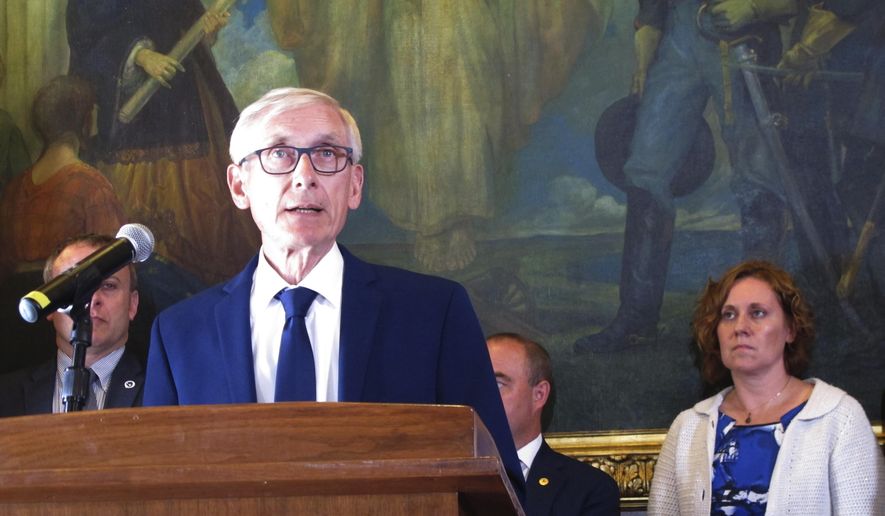MADISON, Wis. (AP) - The Latest on a Wisconsin Supreme Court decision to uphold state laws introduced in a lame-duck session in December (all times local):
9:20 a.m.
Wisconsin Gov. Tony Evers is bemoaning a state Supreme Court ruling in favor of Republicans who held a lame-duck legislative session last year to weaken his powers.
The Democratic governor on Friday called the ruling a disappointment and “all too predictable.”
He says the 4-3 decision by the conservative-controlled court is “based on a desired political outcome, not the plain meaning and text of the constitution.”
The court ruled that Republicans legally called the session, which was convened in December shortly after Evers defeated Republican Scott Walker but before he took office.
Evers says the constitution was designed to prevent lawmakers from quickly passing laws without public scrutiny. He calls the lame-duck session “an attack on the will of the people, our democracy, and our system of government.”
___
8:30 a.m.
Wisconsin Republicans are heralding a state Supreme Court ruling affirming a lame-duck legislative session used to pass laws limiting powers of the Democratic governor and attorney general.
The conservative-controlled court ruled 4-3 Friday in favor of Republicans. The court says Republicans were within their legal rights to call the December session, which convened just before Democratic Gov. Tony Evers replaced defeated Republican Scott Walker.
Republican legislative leaders say in a joint statement that the ruling is a “common sense decision.” Assembly Speaker Robin Vos and Senate Majority Leader Scott Fitzgerald are calling on Evers to work with the Legislature “instead of pursuing his political agenda through the courts.”
Two other lawsuits, one before the state Supreme Court and one in federal court, are pending.
___
7:45 a.m.
Conservatives who control the Wisconsin Supreme Court have sided with Republicans legislators in saying they legally called a lame-duck legislative session to pass laws limiting the powers of the new Democratic governor and attorney general.
The court ruled 4-3 Friday along ideological lines.
The majority says the Wisconsin Constitution gives the Legislature the authority to decide when to meet in session, so Republicans did nothing wrong in convening in December, shortly after then-Gov. Scott Walker was defeated.
Liberal justices dissented, saying the law doesn’t allow for the Legislature to call such a session.
Most of the laws have been ordered to be in effect despite this court challenge and two others, including one in federal court, that are pending.
___
7:25 a.m.
The conservative-controlled Wisconsin Supreme Court has upheld Republican-authored lame-duck laws limiting the powers of Democratic Gov. Tony Evers and Attorney General Josh Kaul.
The court handed down the decision Friday, rejecting arguments that the Legislature convened illegally to pass the measures in December.
Republicans in several states have passed laws in lame-duck sessions following election losses in recent years. Democrats have decried the tactics as brazen attempts to hold onto power.
A group of liberal-leaning organizations led by the League of Women Voters sued in January alleging the Wisconsin laws are invalid because legislators convened illegally to pass them.
But the Supreme Court ruled that the session was legal.
Two other lawsuits challenging the Wisconsin laws are pending in state and federal court.
___
12 a.m.
The Wisconsin Supreme Court is preparing to rule on a legal challenge to a lame-duck session the state’s Republican-controlled Legislature called after setbacks in last year’s midterm election.
GOP legislators passed several laws to curtail the power of incoming Democrats during the session, which followed losses by Republican Gov. Scott Walker and the state’s attorney general.
Liberal-leaning organizations sued, arguing the session was illegal. A county judge agreed and blocked the laws, but a state appeals court stayed that ruling.
Among other things, the laws prohibit Gov. Tony Evers from pulling the state out of lawsuits without legislative approval and require the attorney general to get lawmakers’ permission to settle cases.
Lawsuits in state and federal court challenging the laws themselves are also pending.




Please read our comment policy before commenting.